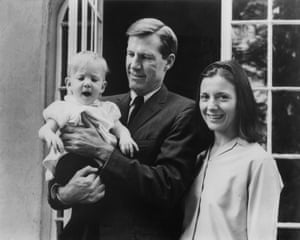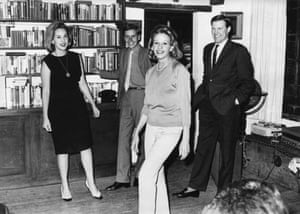JFK documents could show the truth about a diplomat’s death 47 years ago
Charles Thomas was a rising star at the state department in the early 1960s, a career diplomat who had served across Latin America and Africa. His colleagues were convinced he would earn the rank of ambassador. They agreed that the tall, jut-jawed, preppy, handsome Thomas – described by colleagues as “the diplomat from central casting” – adored his wife Cynthia and two young daughters.
But then something went horribly wrong. In 1971, at the age of 48, Thomas killed himself.
The death certificate showed that on Monday 12 April, at about 4pm and in the second-floor bathroom of his family’s rented home on the banks of the Potomac river in Washington, Thomas lifted a gun to his head. Cynthia, downstairs, thought the boiler had exploded.
The reasons for the suicide were not a complete mystery. Thomas had been despondent after he had been denied a promotion two years earlier and forced out of the state department. In the 1960s, the department had an up-or-out policy – diplomats were either promoted or they were “selected out”, to use the department’s Orwellian term.
For Cynthia and the rest of the family, the nightmare was compounded months later by a terrible discovery – Thomas had been “selected out” in error. A clerical mistake had apparently cost him his cherished 18-year career.
According to the department, Thomas was denied a promotion because part of his personnel records, including a glowing job evaluation from the embassy in Mexico, had been accidentally misfiled. The family received a formal written apology, signed by Gerald Ford. Congressional outrage led the state department to overhaul its promotion system.

Charles and Cynthia Thomas hold newborn Zelda in the porch of their Mexico City home in the mid-1960s. Photograph: Courtesy of Cynthia Thomas
But now, four decades later, Thomas’s widow and others say they are convinced they are still being denied the full truth about what put Thomas on a path to killing himself. In that cause, they are pleading with Donald Trump to release classified documents from the National Archives.
The documents are long-secret government files about – of all things – the assassination of John F Kennedy.
‘True nature of the Kennedy assassination’
The Thomas family acknowledges that theirs is a bizarre and complicated story. But they are convinced – with good reason, given what they have discovered – that if Thomas’s personnel records were misfiled it was intentional, and that it was never the real reason for his firing.
They are certain that Thomas lost his career – and ultimately his will to live – because senior officials were determined to shut down his persistent, unwelcome and ultimately fruitless effort to reopen an investigation of JFK’s murder.
There is a long paper trail. Documents released to the public show that during a posting in Mexico in the mid-1960s, Thomas came across evidence that showed Lee Harvey Oswald – who visited Mexico City in September 1963, weeks before killing Kennedy – had been in contact there with Cuban diplomats and spies who wanted JFK dead and might have offered help and encouragement.
In internal memos not made public until years after his death, Thomas told supervisors such information from Mexico could undermine the findings of the presidential panel that determined in 1964 that Oswald acted alone. In one memo, Thomas warned that the Mexico information “threatened to reopen the debate about the true nature of the Kennedy assassination and damage the credibility of the Warren report”.
For historians, Oswald’s trip to Mexico has never been adequately explained. Available records shows that the CIA and FBI knew much more about it – and the threat Oswald posed – than they ever shared with the Warren commission. The agencies appear to have withheld evidence out of fear they might be blamed for bungling intelligence that could have saved Kennedy’s life.
Oswald, a Marine Corps veteran and self-declared Marxist who had once tried to defect to the Soviet Union, met in Mexico with Cuban and Soviet diplomats and spies and, according to a long-secret FBI report, talked openly about his plan to kill Kennedy.
Given Trump’s deadline next week – a deadline he set himself – to release thousands of still-classified documents related to the assassination held by the National Archives, the Thomas family says questions about their family tragedy are urgent once again.
Many of those documents are known to have come out of the files of the CIA station in Mexico at about the time of Oswald’s visit, which suggests they could bolster Thomas’s suspicions about what happened there.
In an interview, Thomas’s youngest daughter, Zelda Thomas-Curti, a Minneapolis business consultant who was born in Mexico, described her father as “one of America’s most important – if mostly unrecognized – 20th-century government whistleblowers”.
On behalf of her family, including her own three children, Thomas-Curti said she had written to Trump, to ask him to do justice to her father’s memory by releasing all remaining JFK files.
“Washington overpowered my father like a steam shovel, tossing him into a heap like discarded dirt,” she wrote. “But he was a hero who was out there fighting for the truth.” She told Trump that she wanted “my three children to know that their grandfather was a real-life hero”.
Thomas’s widow, Cynthia, who went on to her own career in the state department and now lives in Minnesota, said the family deserved to see all the JFK documents. “My grandchildren are entitled to know the truth about Charles,” she said.
‘As much access as possible’
In 1992, Congress passed the JFK Assassination Records Collection Act. Lawmakers hoped it would damp down raging conspiracy theories created by the release of Oliver Stone’s conspiracy-laden film, JFK, the year before.
The law called for release of all assassination-related documents. As a result, millions of pages were made public in the 1990s. Several thousand other documents, initially held back because of national security concerns, were supposed to have been released last October, the 25th anniversary of the law’s passage.
But Trump delayed the release for another six months, citing security concerns raised by the CIA and FBI. The new deadline is 26 April.
The White House has given no clue about whether the president will now allow the full library of documents to be made public. But Trump, who is no stranger to conspiracy theories, including about the Kennedy assassination, has vowed transparency. “The American public expects – and deserves – its government to provide as much access as possible” to the JFK records, he said last year.
The exact number of assassination-related documents still held is in question, since there is no definitive public inventory. A research group, the Mary Ferrell Foundation, said last month its tally showed more than 21,890 documents were still being withheld in full or in part.
The National Archives has produced a bare-bones index, which shows that many of the documents are drawn from the CIA station in Mexico City. For Thomas’s family, as well as for many JFK historians, that suggests those documents may refer to surveillance of Oswald and his contacts in Mexico.
Previously declassified files show that CIA officers in Mexico conducted close surveillance of Oswald as he apparently sought a visa to defect to Havana. The files show that he visited both the Cuban and Soviet embassies and that he may have had a brief affair with a Mexican woman who worked in the Cuban consulate.
In a once-classified 2013 internal CIA report, the agency’s chief historian concluded that the CIA had conducted a “benign cover-up” to withhold “incendiary” information. The cover-up, the report said, was intended to keep the commission focused on “what the Agency believed at the time was the ‘best truth’ – that Lee Harvey Oswald, for as yet undetermined motives, had acted alone in killing John Kennedy”.
‘A responsibility for seeing it through’
Previously declassified records referring to Thomas show that he was repeatedly rebuffed when trying to reopen an investigation of Oswald’s Mexico trip.
In a memo written in 1969, in his final days at the department, Thomas made a last plea that someone go back to Mexico. Though he made no allegation that Fidel Castro had any personal role in any plot to kill Kennedy, Thomas wanted the US to investigate whether the Warren commission had missed evidence of a conspiracy in JFK’s death between Oswald and Cubans loyal to the Castro regime.

Thomas (far right) standing next to the writer Elena Garro (center) and Elena’s daughter Helena (far left), with an unidentified man, at a gathering in Mexico City, mid-1960s. Photograph: Courtesy of Cynthia Thomas
“Since I was the embassy officer who acquired this intelligence information,” Thomas wrote, “I feel a responsibility for seeing it through to its final evaluation.”
The memo outlined a story that Thomas first heard in 1965 from a friend – Elena Garro de Paz, a prominent Mexican writer whose husband, Octavio Paz, later won the Nobel prize for literature. Garro said she had encountered Oswald at a family dance party in Mexico City in the fall of 1963 that was attended by Cuban diplomats and Mexican leftists who supported the Castro revolution. According to Garro, people at the party had spoken openly of their hope that Kennedy would be killed.
According to Garro, who died in 1998, Oswald was invited to the party by her cousin Silvia Duran, a vivacious young woman who worked at the Cuban consulate. Garro told Thomas she was certain Oswald and Duran had a brief affair.
In the years since Thomas’s paperwork was made public, Duran, who is still alive, has insisted that she did not have an affair with Oswald and only met him inside the Cuban consulate. But other Mexicans, including members of Duran’s extended family, have disputed her account. A Mexican journalist recalled seeing Oswald at a separate reception, at the Cuban embassy.
*** This article has been archived for your research. The original version from The Guardian can be found here ***


